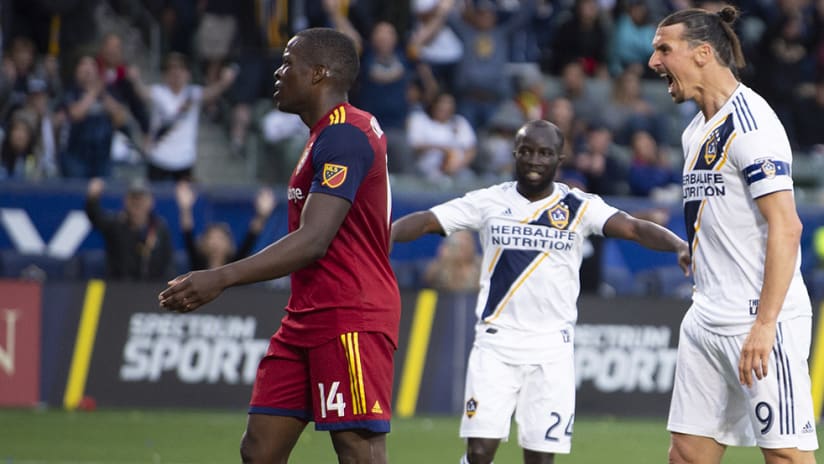You probably don't want to hear most of the things said on a soccer field. Let your idols stay idols.
After the LA Galaxy beat Real Salt Lake 2-1 on Sunday, RSL center back Nedum Onuoha told reporters, “[Zlatan Ibrahimovic is] saying to me he's going to do me, he's going to hurt me for that game.” Onuoha was unhappy about the comments and refused to talk to the Galaxy striker after Ibrahimovic walked into RSL's locker room. The former Queens Park Rangers captain compared Ibrahimovic's comments to something a thug would say on the field later.
Onuoha is absolutely right to stand up to Ibrahimovic; no player or person, should take what Zlatan said in stride. But Zlatan didn't break any unwritten rules.
The Galaxy striker didn’t deny it or apologize for them. While the words might make a person uncomfortable to read on a page, he’s not the first to say them on a soccer field and he won’t be the last. Players with way less talent and clout have done the same thing. It's a common comment on the field, but it's not uncommon, either.
If Zlatan had actually hurt or tried to hurt Onuoha, then it would be a different conversation. Intentionally hurting someone is horrific; I actually find it reductive to say it matters if they talked crap beforehand.
But Ibrahimovic didn’t act on the suggestion. It stayed as words. There’s something to remember about words used on the field: They are rarely for the receiving player. They are almost entirely directed toward the player saying the words. The more you talk, the more you force your mind to focus. The more you yell at someone, the more you force your heart to stay pumping. The anger and inappropriate words are a side effect of the intensity with which we demand athletes to perform.
As Ibrahimovic told the media after the game, “I like to feel alive. I like when it becomes duels and that, because sometimes – not that I fall asleep, but I don't feel alive if they don't actually activate me. ... When I get angry, I feel good.” That’s true of a lot of players. Players need to be in a certain mental state on the field. Every player gets to his own mental state in his own way.
Watch your favorite player when he’s away from the ball. Notice how often he’s talking to someone -- himself, a teammate, an opponent, the ref. It’s generally not a rational tactical note. It's usually quick, nonsensical shouting. That guy is in a place. You can’t separate the heart, the brain, and the mouth in those moments. Even the nicest guys in the world say things you wouldn’t want to hear on the street.
I don’t necessarily find it OK for players to swear at each other or the referee during a game; as a normal human, I don’t like the idea of living in a world where people threaten others. But I accept that professional athletes have huge demands placed on them and their own ways of delivering on those demands. As long as they don’t actually hurt another person – through physical harm or culturally-abusive language – they should be given room to do their job.
Now, this isn’t to say that Zlatan didn’t get close to the line. Few professional players will tell you he crossed the line, but he definitely ventured into the, “come on, bro” zone. Telling someone you are going to hurt him won’t get you onto a blacklist, but it’s not exactly kosher, either.
In the same vein, good on Onuoha for standing his ground. Someone doesn’t have to break a rule for you to get annoyed with them. Onuoha was right to take a stance.
Both players toed the line, neither crossed it. That’s exactly where they need to be.














